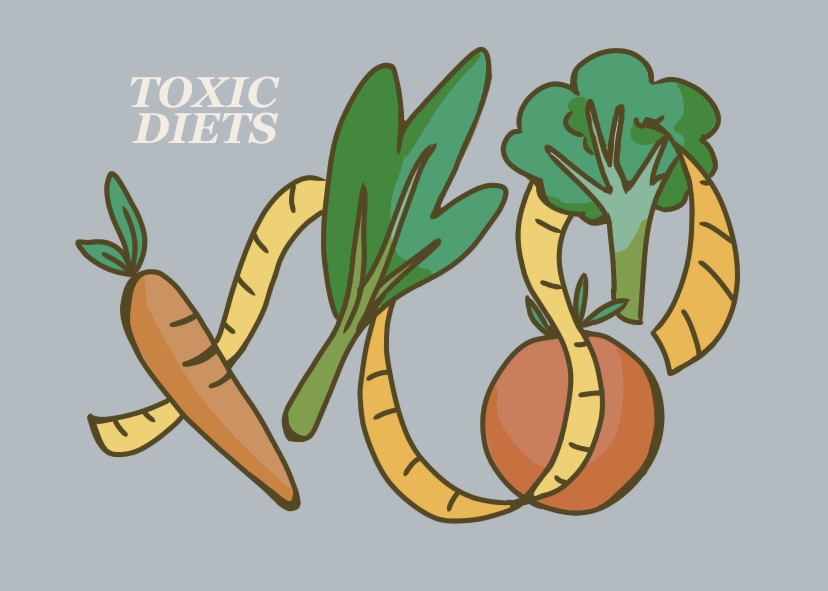Children Should Not be Placed on Toxic Diets
October 18, 2022
Parents often have a “vision” of what they want their child to become: strong, tall, rich, and most of all, healthy. In the midst of ensuring the health of their child, many parents unintentionally ingrain toxic food relationships by agonizing over their child’s health and placing restrictions on their diet. For generations, detrimental eating habits have been passed down from parent to child since unhealthy relationships with food are all their parents have ever known. Nevertheless, no situation of a parent can justify forcing a child into a toxic and restrictive diet.
Regardless of the actual needs of the child, unhealthy diets tend to aim for either weight loss or weight gain. These often unattainable goals are most likely set by the parent and can leave the child with negative feelings towards food. A healthy diet, however, is also commonly utilized in many households. Healthy diets are focused on the child’s nutritional needs and are centered on the happiness and overall well being of the child, rather than the child’s figure and weight.
“It is estimated that nearly 32 percent of children age 2-19 in the U.S. are overweight or obese,” First 5 LA claims. Restrictive dieting can take place when the child is as young as one to two years old; an example of this would be parents reducing the amount of food they feed their child, or banning certain foods like desserts to prevent weight gain. While this situation is rare, the increasing obesity rates have caused parents a good amount of concern for their young children. These worries can lead to parents taking drastic measures to ensure a “healthy” child.
However, the diet of toddlers normally consists of high-fat foods, because “babies need a high-fat diet to support [their] rapid growth and development,” says M.D. Karen Gill in Are Fat Babies Healthy? Even if the baby fat is lost, it doesn’t guarantee a slim child in the future; if anything, it increases the likelihood of the child having trouble with food regulation in the future.
“What looks like success in early life becomes detrimental to children’s ability to regulate their food intake when older (Mitchell et al., 2013),” states Peggy Crum, writer of Kids Don’t Need to Diet. Ever.
Jodie Sadowsky, Cable News Network, claims, “further, parental encouragement of dieting in kids was a significant predictor of a higher risk of overweight or obesity, dieting, binge eating, engaging in unhealthy weight control behaviors and lower body satisfaction, according to a 2018 study.”
Restrictive eating isn’t the only kind of diet. For instance, force feeding is practiced quite often; with this type of diet, parents make children finish their plate before leaving the table, or parents physically place food in a child’s mouth and force them to swallow. The latter is quite common among toddlers, especially those that appear too skinny for the parent’s liking. While the parents’ actions can have good intentions, the consequences of their actions can be negative and damaging to their children’s health.
“Sadly, it is often parents who register their child for these programs with good intentions but horrible results for their child’s long-term emotional and mental health,” states Kayla Valley, author of The Effects of Dieting on Kids and What to Do Instead.
Although fairly obvious, many parents do not realize just how much their children idolize them. Because of the children’s glorifying perception of the parent, what a parent does in relation to dieting may affect their children’s view of food. Talking about food as either “good” or “bad” places a stereotyping mentality on young children that signals that certain foods are good for them and others are bad.
Trying to reverse the effects of poor dieting later on may not even work, especially as they grow older. Common problems that occur as children grow older include binge-eating, over-eating, or eating disorders and body insecurities that can cause bulimia and anorexia. With some parents banning junk food in the house, it can compel teenagers to desire them even more, or to feel guilty and upset at themselves for wanting to eat. Additionally, children may feel like it is a “guilty pleasure” to eat foods that they enjoy, such as desserts. In addition, parents who speak negatively about their own body in front of their children will teach the kids to have insecurities about themselves. An example of this could be with the relationship between supermodel Gigi Hadid and her mother, Yolanda Hadid. As a model, Gigi maintains a lean figure by utilizing a strict diet. Yolanda has frequently been filmed and criticized several times for reprimanding her daughter for eating.
At Yolanda’s birthday party, a fan wrote, “Imagine shamelessly telling your teenage daughter at her birthday party ‘I can’t believe you did that when they eat a small piece of cake. Awful.”
Parents should focus on the wellbeing of their child rather than their physical appearance. It is important to preserve a child’s youthful mentality for as long as possible, and to reinforce the importance of listening to your own body’s signals to whether you are hungry or full. The toxicity and unhealthy nature of diets have been shown to have detrimental effects on youth. Parents should be aware of the power and influence they hold over their children.
Graphic courtesy of Vanessa Valentino

